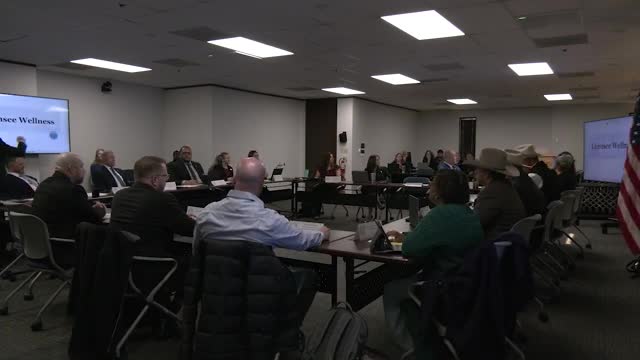TCOLE committee hears tighter pre-employment and fitness-for-duty processes, greater data visibility
Get AI-powered insights, summaries, and transcripts
Subscribe
Summary
Advisory committee members reviewed recent changes to TCOLEfitness-for-duty, applicant psychological evaluations, and arrest-notification processes and discussed gaps in examiner availability and consistency, especially for remote and small agencies.
Members of a Texas Commission on Law Enforcement advisory committee discussed recent changes to pre-employment psychological evaluations, fitness-for-duty procedures and TCOLEdata collection after officersarrests.
Speakers described steps TCOLE has taken to tighten pre-employment evaluations: more standardized forms, clearer instructions that agencies rather than applicants should select examiners, and expanded packet contents sent between psychologists and agencies. "The rule requires you to get all those things; that's now on the form," the presenter said, describing steps intended to reduce cases where applicants "shop" examiners or otherwise conceal relevant background information.
Dr. Kevin Smith, a clinical psychologist who conducts L-3 pre-employment/fitness assessments, told the committee that assessments look beyond diagnosable psychiatric illness to evaluate emotional regulation, judgment, impulse control, decision making, social skills and de-escalation ability. He and other speakers warned that examiner training and experience vary across the state and that small or remote jurisdictions sometimes lack access to qualified evaluators.
The committee reviewed TCOLEnotifications such as the E-1 electronic arrest form and the agency's subscription to DPS arrest data, which now covers the large majority of licensees. TCOLE staff described how new digital reporting allows staff to build datasets showing trends (for example, arrests for DWI, repeat misconduct allegations, hiring and separation patterns) that could inform early-warning efforts and post-arrest communications.
Panelists discussed failure rates and the tension between two types of error: being overly strict (disqualifying candidates who would succeed in the job) versus too loose (hiring candidates who become liabilities). One psychologist said typical failure rates for L-3 evaluations run roughly 10—13% depending on the applicant pool and rigour of background investigations.
Committee members flagged practical issues for follow-up: how to increase the pool of qualified examiners in underserved areas, where to post guidance for agencies about choosing examiners and whether TCOLE should add training elements for agency administrators about early-warning indicators. TCOLE staff said they are preparing a training block and model policies that could be made available to chiefs and hiring officials.
